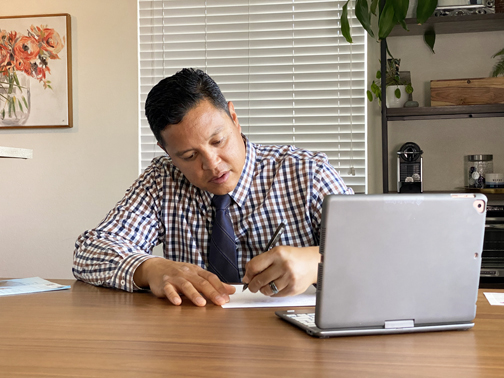
Gabriel Medrano was working on the docks across the East River when he heard the first plane crash into the World Trade Center on 9/11.
“I remember seeing the burning office paper coming across the river,” said Medrano, who now lives in the Greater Los Angeles area with his wife, Asia. “It was raining down.”
Once safely inside his Brooklyn workspace and looking out a window, he watched the second plane hit the South Tower.
“When the first tower fell, I remember thinking to myself, ‘I just saw thousands of people die,’” said Medrano, who grappled with anxiety, depression and post-traumatic stress disorder years later as a result of what he witnessed.
Medrano found immediate comfort in sharing Bible verses with others.
“It was very fulfilling and satisfying to feel like you were helping other people [who] were going through something similar,” said Medrano. “To be able to share just a Scriptural thought with someone and to see them comforted right away was therapeutic for me, but I know I was helping them too.”
Helping others has long been linked to better emotional well-being in psychology research. The book “The Healing Power of Doing Good: The Health and Spiritual Benefits of Helping Others” describes “powerful” effects, even for helpers who have experienced trauma themselves.
Trauma was all too common among the many volunteers at Ground Zero. Roy Klingsporn, a Brooklynite who volunteered at Ground Zero nearly every day for two months, recalled on one occasion approaching a man who sat slouched in a golf cart near the site’s makeshift morgue.
“When I asked him how he was doing, he burst into tears,” said Klingsporn, now of Fort Lauderdale, Florida. “He said, ‘I’m tired of picking up body parts.’”
Within days of the attacks, Jehovah’s Witnesses set up teams that spent hours each day in Lower Manhattan, Bibles in hand, consoling everyone from the families of victims to first responders battling physical and emotional exhaustion. It was a work that changed how the organization approaches disasters, with an organized comfort ministry now being an integral part of its response to natural disasters and even the pandemic.
Recalling the gut-wrenching days he spent as one of those volunteers near the smoldering remains of the Twin Towers still stirs deep feelings in Robert Hendriks.
“It was very emotional and extremely difficult for me, but the faces of those I passed on the street said it all,” said Hendriks, now U.S. spokesman for the Witnesses. “They needed comfort, and the best thing I could give them was a hug and a Scripture.”
For Brown “Butch” Payne, the events of Sept. 11, 2001 tore open old wounds, bringing back vivid wartime memories the Vietnam veteran had tried to forget.
From his East Village apartment, Payne recalled the crowds of frantic people streaming north from Lower Manhattan. “That sight stirred up a lot of emotions in me,” he said. “It shook me to the core.”
Payne found relief in rendering aid the best way he knew how.
“Sharing the Bible’s message of hope softened the blow for me,” he said.
Offering a shoulder to cry on brought Klingsporn comfort too.
“It was satisfying to be of help to my community,” he said.
Two decades later, Medrano continues to find comfort from reaching out and sharing his faith with others.
“I look at other people, and it is obvious that they are looking for something to hope in,” said Medrano. “So, when you share something solid with them, it just reinforces my faith. That helps a lot.”
Payne feels the same. In 2016, after 50 years of marriage, he lost his beloved wife to cancer. On days when his grief feels overwhelming, Payne writes heartfelt letters that lift his neighbors’ spirits – and his own. He shares Scriptures and resources that have helped him, like articles on coping with trauma and loss on jw.org, the official website of Jehovah’s Witnesses.
“Encouraging others to look to the future helps me to do the same,” he said.
Submitted by JW
